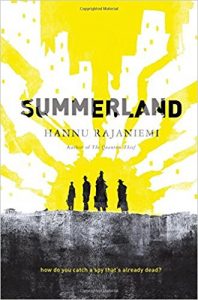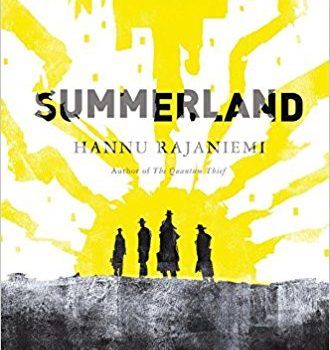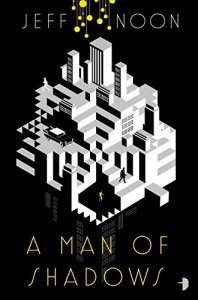Gary K. Wolfe reviews Summerland by Hannu Rajaniemi
 Summerland, Hannu Rajaniemi (Tor 978-1-250-17892-3, $25.99, 304pp, hc) June 2018.
Summerland, Hannu Rajaniemi (Tor 978-1-250-17892-3, $25.99, 304pp, hc) June 2018.
Those who are as impressed as I was with the coruscating style and dense information environment of Hannu Rajaniemi’s Quantum Thief trilogy might be a bit taken aback at the very different sort of world of his Summerland, which is essentially an espionage procedural set in 1938 Britain. It quickly becomes apparent that this isn’t our 1938, and Rajaniemi’s England is only tangentially connected to recognizable history, with a handful of familiar figures that include a few real-life spies like Kim Philby and Anthony Blunt, and even Josef Stalin – who in this world is a Russian dissident trying to seize power during the Spanish Civil War. By far the most dramatic difference, though, is that the spirit world is a major player in the espionage games following the First World War, in which Germany was defeated with the assistance of ‘‘ectotechnology,’’ which includes such supernatural weapons as ‘‘ectotanks’’ and ‘‘aetherguns.’’ The Pope, named Teilhard, promotes a vision of universal evolution, which sounds a lot like the ideas of the famous French philosopher. Most important is the presence of Summerland, a luxurious metropolis for the recently dead – although, like the chocolate factory, you need a ticket to get in, or else face just fading away. Designed by ‘‘aethertects’’ to look like upscale neighborhoods of London, it houses millions of newly dead, most of whom hope eventually to join an Oversoul-like ‘‘Presence.’’
Just as Rajaniemi initially wrapped his phenomenally inventive Quantum Thief world around a rather straightforward master-thief tale inspired by Arsène Lupin, he reveals this bizarre world through a version of the classic British spy narrative, with its double agents, betrayals, secret agendas, myopic bureaucrats, class tensions, and worn-out idealists. The central point of view characters are Rachel White, a 20-year veteran of the Secret Intelligence Service, who saves a valuable Russian asset from getting killed in a pointless duel only to have him blow his own brains out during a cat-and-mouse interrogation – but not before revealing to her that he’s been running a secret agent in Summerland named Peter Bloom. When Rachel tries to report this, her superior – one of those addled, thoroughly sexist bureaucrats – is so convinced that she’s been duped that he demotes her to the finance section. Needless to say, she sets about continuing her own investigation in secret. Meanwhile, we follow Peter Bloom’s own adventures as a ghost – whose perceptions of the world are quite different: ‘‘the material world was invisible, except for electricity and the soul-sparks of the living.’’ Like other newly dead, though, the spirits can be reached by mediums and can for short periods of time inhabit host bodies among the living.
As different as this world of ectoplasm and aether might seem from the gevulots and oubliettes of Rajaniemi’s earlier trilogy, it turns out to serve some similar functions as a form of information technology. Rachel’s ‘‘ectophone’’ may be a 1930s-style contraption of Bakelite and rubber, but she can use it to call a spirit clerk, who in turn can ‘‘thought-travel’’ to the ‘‘aetheric stacks,’’ in a ghostly version of data-mining. ‘‘Aethertects’’ can construct what is essentially a virtual world out of ectoplasmic materials, and the newly dead gradually develop ‘‘hypersight,’’ which amounts to a kind of augmented reality, enabling them to perceive new directions. ‘‘Soul-stones’’ carry people’s memories into Summerland, not all that different from the supertech ‘‘gogols’’ of The Quantum Thief, just as Summerland itself has some qualities in common with the ‘‘spimescapes’’ of that novel. In other words, Rajaniemi may have traded in his fabulous posthuman mindscapes for the vocabulary of spiritualism, but he works out the details in much the same SFnal way. The reader may on occasion get so tangled in the convoluted details of Rajaniemi’s espionage melodrama that juggling them with the parameters of this new cosmology and the subtleties of alternate history can get daunting, but in the end Summerland is in its own way as persuasive an example of Rajaniemi’s disciplined inventiveness as his better-known hard SF. The concepts may have been swapped out, but rules are rules.
Gary K. Wolfe is Emeritus Professor of Humanities at Roosevelt University and a reviewer for Locus magazine since 1991. His reviews have been collected in Soundings (BSFA Award 2006; Hugo nominee), Bearings (Hugo nominee 2011), and Sightings (2011), and his Evaporating Genres: Essays on Fantastic Literature (Wesleyan) received the Locus Award in 2012. Earlier books include The Known and the Unknown: The Iconography of Science Fiction (Eaton Award, 1981), Harlan Ellison: The Edge of Forever (with Ellen Weil, 2002), and David Lindsay (1982). For the Library of America, he edited American Science Fiction: Nine Classic Novels of the 1950s in 2012, with a similar set for the 1960s forthcoming. He has received the Pilgrim Award from the Science Fiction Research Association, the Distinguished Scholarship Award from the International Association for the Fantastic in the Arts, and a Special World Fantasy Award for criticism. His 24-lecture series How Great Science Fiction Works appeared from The Great Courses in 2016. He has received six Hugo nominations, two for his reviews collections and four for The Coode Street Podcast, which he has co-hosted with Jonathan Strahan for more than 300 episodes. He lives in Chicago.
This review and more like it in the June 2018 issue of Locus.
 While you are here, please take a moment to support Locus with a one-time or recurring donation. We rely on reader donations to keep the magazine and site going, and would like to keep the site paywall free, but WE NEED YOUR FINANCIAL SUPPORT to continue quality coverage of the science fiction and fantasy field.
While you are here, please take a moment to support Locus with a one-time or recurring donation. We rely on reader donations to keep the magazine and site going, and would like to keep the site paywall free, but WE NEED YOUR FINANCIAL SUPPORT to continue quality coverage of the science fiction and fantasy field.








